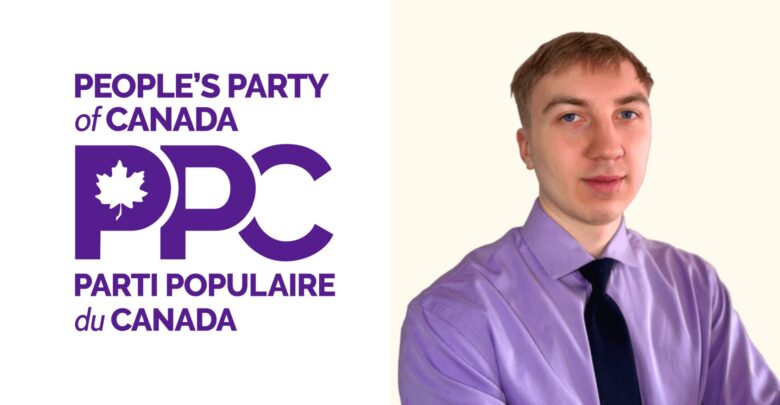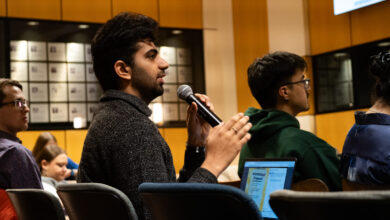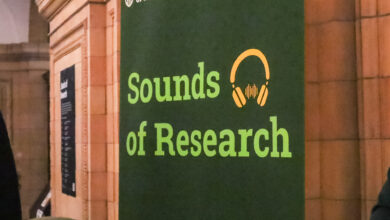Federal election 2025 candidate Q&As: David Wojtowicz (PPC)
"We [have] to lift any sort of obstacles in the way because ... an educated nation is a thriving nation," Wojtowicz says.
 Supplied
SuppliedThis article is part of The Gateway’s Q&A series with the 2025 federal election candidates for the Edmonton Strathcona riding.
David Wojtowicz is the People’s Party of Canada’s (PPC) candidate for Edmonton Strathcona in the 2025 federal election. The Gateway interviewed Wojtowicz about student issues in this federal election.
Wojtowicz grew up in Edmonton and went to school in Strathcona. He’s now a business student at the Northern Alberta Institute of Technology (NAIT).
Why are you running in this election and in Edmonton Strathcona specifically?
David Wojtowicz: I decided that I wanted to run for federal politics because I think that we need change. We haven’t seen much of that last 10 years, and I don’t like any of the options we have right now and I came across the [PPC] not too long ago actually. I really think that their principles, their idea of straying away from partisan politics and turning more into populist government is what we need, and I think that that is a much better form of democracy. I like that the [PPC] will never force candidates to vote in a certain way, and I think that’s what democracy should be. So I decided that I’m going to run, since no one else was running [as a PPC candidate] on the ballot for Edmonton Strathcona, and I think that people need to all be heard. I think people actually in their riding should have a Member of Parliament [(MP)] they can contact. I think that it’s important, and that this is disregarded by a lot of people out there, since 40 per cent [of Canadians] don’t really vote. And I think that we should all be paying more attention to what takes all of our money, what the [government] uses that money for, and what decisions happen, what we’re allowed to do and what we’re allowed to say. I think it’s important.
I think that a nation is very important, and we should all be focusing on that more, because it’s here way before we’re born, and it’s going to be here way after we’re gone. So I think we should all work together to making it better than when we were here. I think that it’s something that we all need to focus on together. And of course, with globalization in the world, our actions influence the decisions of other countries around the world, and it influences millions of people’s lives, or actually billions in this case. So I think that we all need to make decisions that have everybody’s best interests in mind. And I think that populism is the most effective way to govern properly a country, rather than lobbyism. And what we have right now going on with all the partisan politics.
If elected, you would be responsible for representing many of the students who attend the U of A. What would be your priority in representing those students to your party and the government at large?
Wojtowicz: As a student myself, I would say that probably U of A is a similar to how colleges function like NAIT. I think that we need to start moving towards free tuition costs because many other countries in the world have free education. Realistically, that’s what should be expected of every nation because education is important. That’s how you raise good workers. That’s how you raise the next generation and make progress as a nation. So rather than putting all of these stresses on people and financial burdens and student loans afterwards, it should just be free. It should be competitive. It should be government funded because that’s an investment into a nation’s own people. So that’s the very least we should expect, and that’s what I would definitely be working on right away.
I also think that our education system could use many other improvements in various areas because I’m not too impressed with the quality of education we receive at the post-secondary institutes [(PSIs)]. I’m not too impressed with the quality of instructors. I think that there needs to be a better vetting process for that, and we need to have some improvements with different topics that we study too, because a lot of it seems very outdated. Some of my programs, they had documents from like the early 2,000s [that] haven’t been touched upon in like over two decades. So world’s changed a lot in the last two decades, and I think that we need to change just as fast as the world changes, especially within our [PSIs].
Affordability is a big issue for students, whether that’s the price of groceries or housing. How would you and your party work to address this issue?
Wojtowicz: Like I said, the federal government receives a lot of money. They received, I believe, just under half a trillion the other year. And that, in my opinion, sounds like they are making some very poor decisions. Well, I know it’s a provincial matter, but at the end of the day, federal government should be overseeing all citizens in a way that we are all improving together. So it should be helping more and assisting provinces, however it can into moving towards a better education system with half a trillion dollars. I think that a lot of it’s being lost in bureaucracy and that’s the reason why we’re not seeing the impact that we should be seeing from that kind of money. I think that we need better federal programs. That’s what I would be working on, towards free education specifically, because I think that should be one of our priorities. If we have better educated people, there are more skilled workers out there, everything will improve much faster and at a much better rate. So that’s what I would be prioritizing a lot while I would be potentially in parliament.
How would you and your party approach financial support for students and post-secondary institutions through things like student loans, grants, or research funding?
Wojtowicz: Like I said, I would move towards free tuition, or at least government-funded tuition. I think that grants are also very important. Like, for example, the research grants towards, I think U of A it was actually just recently, how they were making some big leap forwards in some cancer research. I think that [research] should be one of our highest priorities, actually, because research is progress. And of course, if we could solve things like cancer, if we can just allocate more funding so that there’s more interest and involvement in these areas, then that could change the whole world, not just our nation. So I think that research should be funded a lot more than it is right now. I think we need more money, definitely in those areas. I think that students should have more incentives to want to research these different topics, and they should have more money to do it. I think that the government is losing too much, like I said, in bureaucracy, so we would be focusing on tackling those areas so that there’s more funds available for everything that actually matters.
The U of A has a French speaking campus, which does receive federal funding. What would you and your party do for French speaking post-secondary students?
Wojtowicz: I myself don’t speak French, but I don’t think that there should be any sort of discrimination or any sort of that. I think that they should just be treated equally. Funding should be equal, in a sense. Obviously there’s more English speaking [students], so if there’s less people in the French program, it would make sense to proportionally fund it differently. But I don’t think that there should be any sort of barriers aside from that, because [French] is, after all, the second language of Canada.
How would you define academic freedom and how would you and your party protect it?
Wojtowicz: Academic freedom should be the ability to go in any direction you please, and without any financial barriers or any other sort of fears of discrimination and whatnot. I think that everything is important, and I think that people should be educated if that’s what they want. I think that we [have] to lift any sort of obstacles in the way because, like I said, an educated nation is a thriving nation. So that’s a big focus, we need to ensure that if somebody wants to learn, they can learn and that nothing stands in the way. The federal government should have facilities, funding, everything prepared for that. And of course, we should have co-ordination so it’s as easy as possible for people to learn and find what they want and how to do it, and what sort of restrictions there could be. Let’s say if there’s some other program they need beforehand, so they know the exact process.
How would you and your party support Indigenous communities and students?
Wojtowicz: Indigenous people are important. They’ve been on this land for a very long time, and I know that we already have many programs to assist [Indigenous people] existing right now and I think that’s great. I don’t think there’s as many obstacles as there was before, in the past for them. I think that it’s great to give them all the opportunity if they want. And of course, we have many different scholarships and government grants and whatnot to help out Indigenous people. I think that’s great. I think that they’re doing pretty well off right now with the opportunities presented to them.
I think that, rather than in the educational district, there’s other areas of focus within Indigenous communities that need priorities. I know that on a lot of reserves, they’re struggling with the clean water and food. I think that if we tackle those problems, then there will be a lot more people interested within education, and while we have all the programs ready for them.




